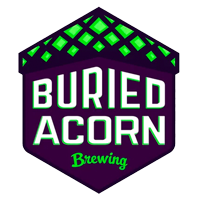Buried Acorn Brewing
Sustainable Solutions Help Reduce Environmental Footprint
 Buried Acorn Brewing Company is small brewery located in Syracuse, New York. In 2019, they produced approximately 2,800 barrels of beer for consumption in their onsite taproom for local distribution. Buried Acorn has pursued environmental excellence over the course of their business growth. In September 2020, sustainability specialists from the New York State Pollution Prevention Institute (NYSP2I) at Rochester Institute of Technology (RIT) and Cornell University’s Cornell Enology Extension Laboratory (CEEL) visited the brewery to collect baseline metrics and identify sustainable improvement opportunities to current operations.
Buried Acorn Brewing Company is small brewery located in Syracuse, New York. In 2019, they produced approximately 2,800 barrels of beer for consumption in their onsite taproom for local distribution. Buried Acorn has pursued environmental excellence over the course of their business growth. In September 2020, sustainability specialists from the New York State Pollution Prevention Institute (NYSP2I) at Rochester Institute of Technology (RIT) and Cornell University’s Cornell Enology Extension Laboratory (CEEL) visited the brewery to collect baseline metrics and identify sustainable improvement opportunities to current operations.

Achievements to date
Buried Acorn staff use a cleaning protocol to clean tanks that includes standard concentrations of the cleaning chemicals to maximize efficacy and prevent waste. They use pH strips to make sure rinse water is neutralized following a cleaning cycle. This helps ensure that cleaning cycles are fully complete and that excess water is not being used to rinse the tank unnecessarily.
Brewers at Buried Acorn send their spent grain to a pig and cow farmer, so minimal solid waste is generated from the brewing process itself. In addition, they recapture the carbon dioxide (CO2) utilized during kegging and cleaning to carbonate beer.

Opportunities
After performing a site assessment of Buried Acorn, NYSP2I and CEEL specialists made a series of recommendations to improve the brewery’s sustainability strategy. These are listed below.
To reduce water use:
- Place water meters on the brewing-process feed lines for additional clarity on how water moves throughout the facility.
- Quantify the amount of water entering the brewing process to determine how much of it is being consumed by the tasting room via the water bill. This informs a more accurate water-to-beer ratio that reflects only the water used in the brewing process.
- Install low-flow fixtures, like spray nozzles and spray balls, which use significantly less water per minute than standard types. Other services can benefit from these fixtures with respect to sinks and other non-brewing uses of water, like hoses. It is recommended that new fixtures be piloted to ensure that they meet performance expectations before being installed.
To generate less waste:
- Compost any brewery waste (like hops, trub, and yeast) that is not sent to a farm. Consider partnering with a local composting company or purchase and set up a commercial-sized compost bin.
To be more energy-efficient:
- Replace the undersized temperature-control system for refrigeration with a properly sized one. If a controller is cooling a larger space than it was designed to treat, it will work harder and more often, using more energy.
- Insulate the hot liquor tank to keep water hot as it passes into the kettle for brewing. Adding even one inch of insulation can result in a 91-percent reduction in energy lost from the tank to the environment.
To use less chemicals:
- Periodically rotate detergents and sanitizers to make them more effective. Rotating aids in the removal of any debris or microorganisms not being effectively handled by the dominant chemical.
- Use the final rinse of tank cleanings as the pre-rinse for other necessary cleanings.





